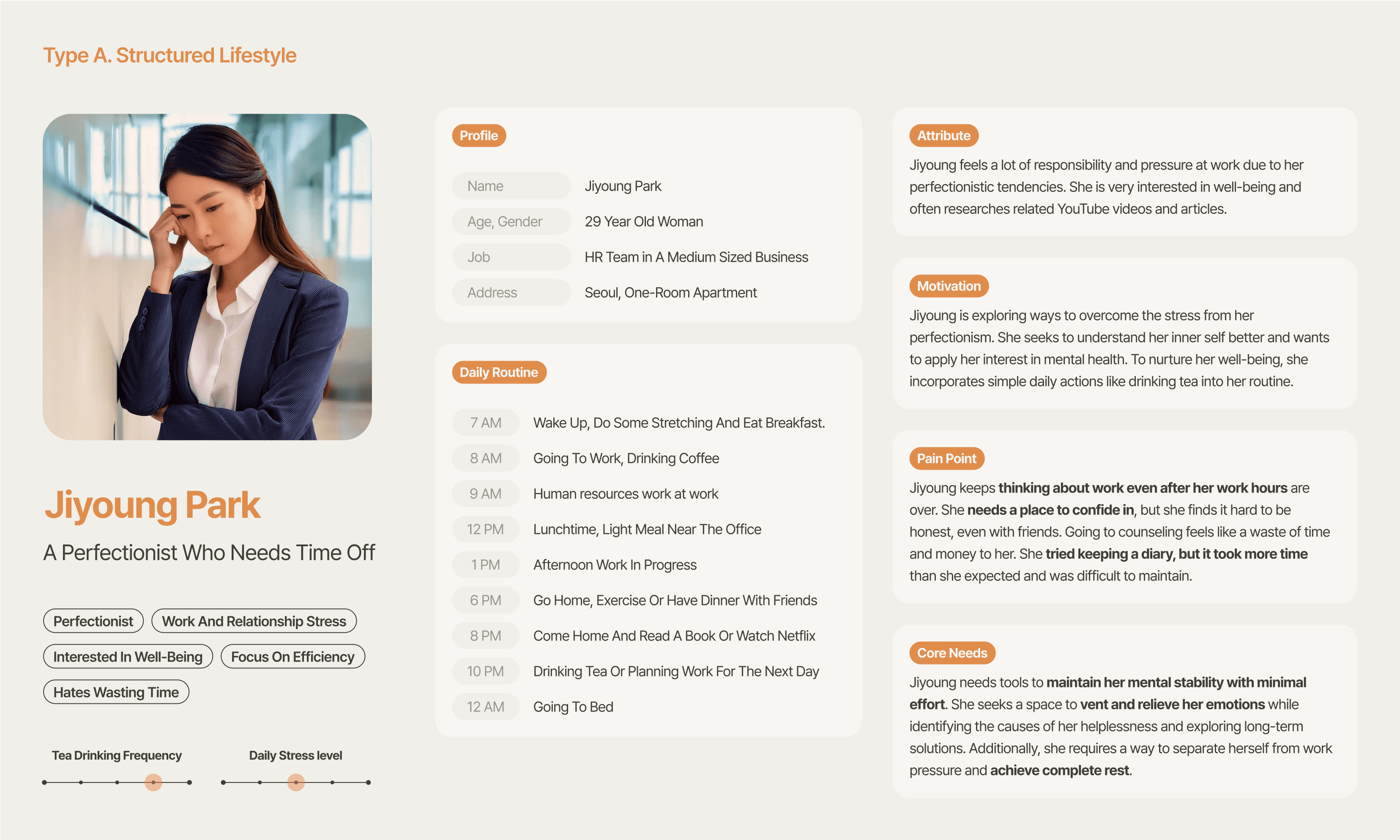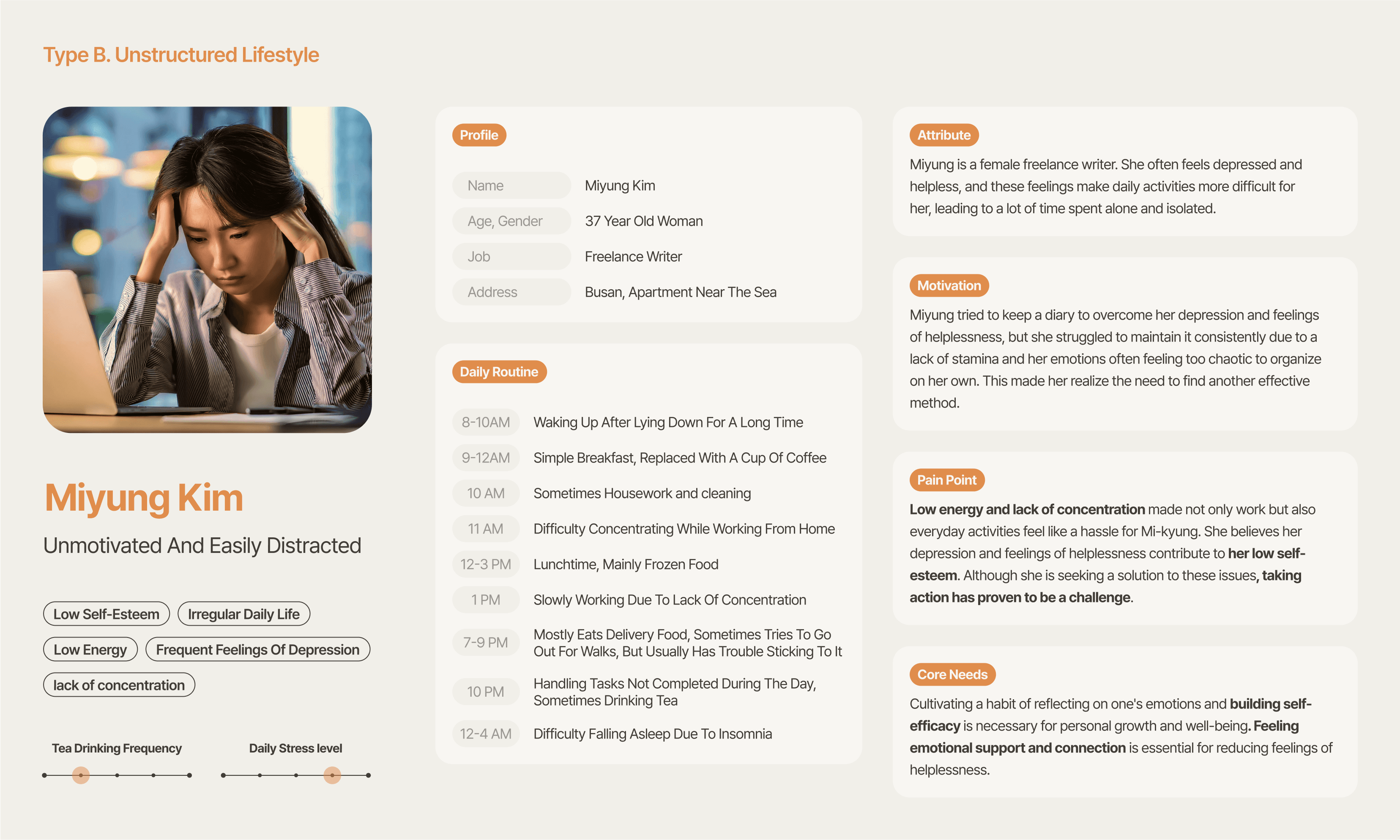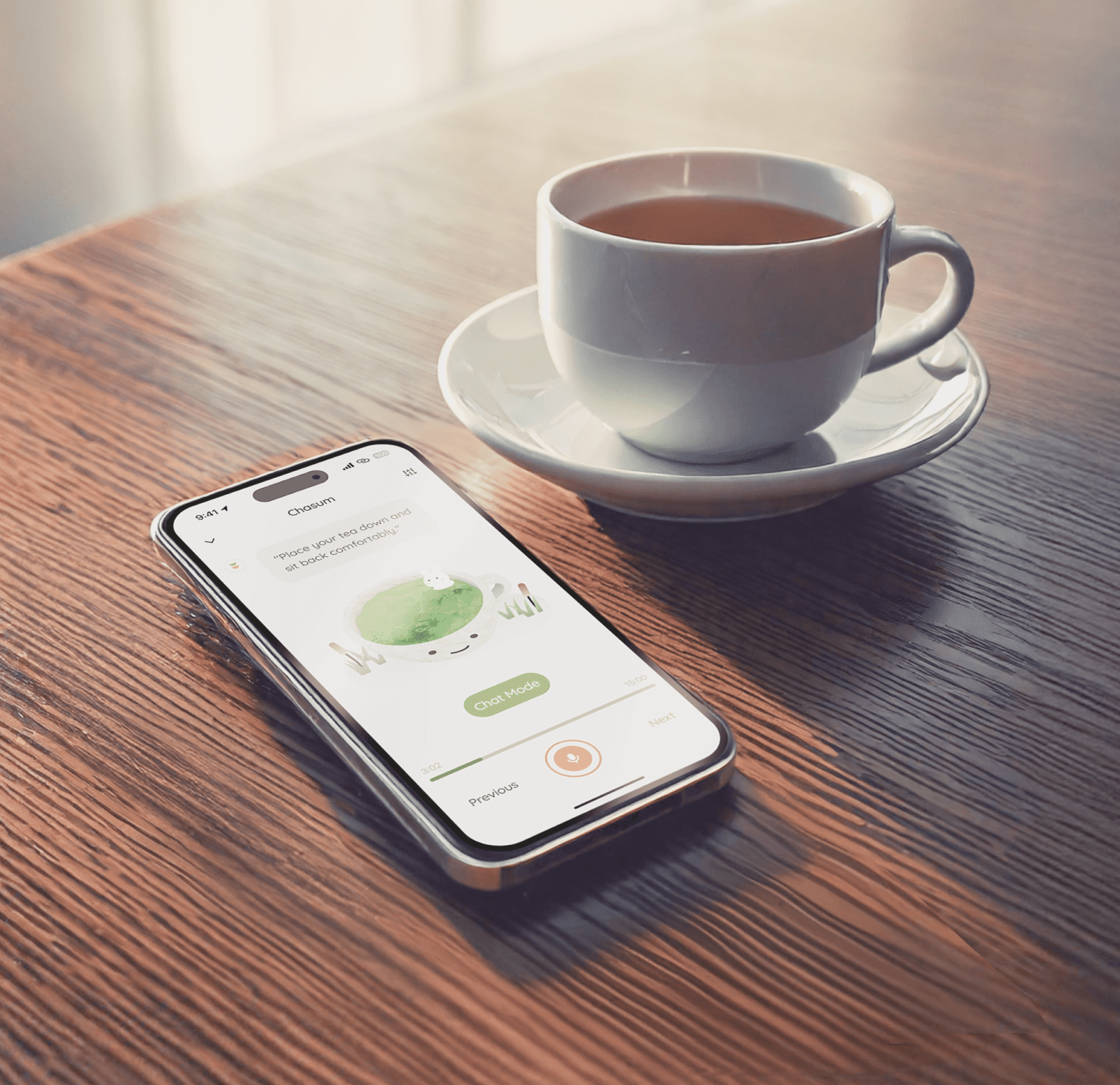Industry
Mental Care
Duration
AUG-NOV 2024
Participation
UX, GUI, Concept (2 People)
Status
Case Study
An Immersive Emotional Journaling App Through Tea Time With an AI Chatbot
Take a moment to understand yourself over a cup of tea.
This project presents an emotional journaling app that pairs tea time with AI-guided conversations. Tea promotes relaxation and focus, while the AI chatbot encourages self-reflection with empathetic support. The app enhances emotional well-being through personalized journaling modes, habit-building missions, and emotion data visualization.
Background
"Feeling down, but afraid of counseling or psychiatric treatment..." How can we help such individuals take care of their mental health on their own?
Action
Interviews on effective mental care methods, User diaries to identify pain points in the emotional journaling process, Psychological research for solution development, and ideation.
Result
Developed a mental care service for journaling emotions while drinking tea. Implemented an AI system to assist with and categorize entries, and designed a personalized notification system.
Jump to Prototype
Challenge
Existing emotion-tracking mental health apps fail to provide meaningful emotional relief for users experiencing depression, making it hard to maintain consistent use.
Desktop Research
The number of people experiencing mental health issues is increasing, but many are reluctant to seek professional medical services. People fear social stigma or discrimination in insurance about experiencing mental health issues.
Rate of Experience with Mental Health Issues
63.9%
2023
2024
73.6%
Rate of Experience with Severe Stress
36%
2022
2024
46.3%
Awareness of Mental Health Services
27.9%
2022
2024
24.9%
[Source] 2024 National Mental Health Knowledge and Attitude Survey Report
Recently, many apps designed to support self-mental care at home have gained popularity. These apps typically focus on features like emotional journaling or guided meditation.

Harukong
1M+
4.8
An emoji mood tracker diary app that allows user to easily and simply document one’s daily life.

Trost
100K+
4.4
Provides remote consultation and treatment through chat or phone with specialists, along with meditation and ASMR for mental wellness.

Mojito
500K+
4.1
User can record your daily emotions using emojis and observe changes in user’s feelings over time.
Interview
While users acknowledged the importance of emotional outlets, existing emotion-tracking mental health apps failed to offer lasting engagement. Instead, participants found emotional relief through warm beverages and conversational interactions like counseling, which helped foster stress relief and self-reflection.
The Gap Between Needs and Existing Solutions: Emotional Journaling
Participants recognized the long-term need for emotional outlets and acknowledged the benefits of emotional journaling for mental well-being.
Many had previously experienced emotional relief through personal journaling but struggled to maintain the habit consistently.
When using simple emotion-tracking digital services, participants found it difficult to achieve the same emotional impact, leading to low engagement and discontinuation.
Despite acknowledging the need for a consistent emotional outlet, participants often reverted to reactive coping, only addressing emotions during intense depressive episodes.
Warm Beverage can help giving Emotional Comfort.
Activities affecting physical conditions, such as drinking tea, eating, or showering, had a significant impact on emotional well-being compared to other methods.
Drinking a warm beverage, especially tea, stood out for its minimal effort and quick calming effect. Many participants mentioned drinking tea regularly to help them relax.
Benefit of Conversations in Counseling for Self-Understanding
Only 2 out of 4 participants had tried counseling, as many were reluctant due to stigma or logistical barriers.
Those who experienced counseling valued it highly, appreciating the comfort of having someone genuinely listen to them. They felt supported and better able to explore and understand their emotions.
Project Focus
Target: Individuals seeking self-mental care without professional support
Purpose: To provide a sustainable emotional journaling experience by addressing the challenges of maintaining consistent self-care habits
Research & Study
Why Simple Emotional Journaling Fails to Provide Lasting Relief?: Lack of Motivation, Shallow Emotional Expression, and Limited Emotional Awareness
User Diary Study
We conducted a 7-day user diary study to identify barriers to maintaining an emotional journal. Participants were provided with a mood-tracking template that included emotion selection and simple text input. The study revealed key challenges users faced, including a lack of motivation, limited immersion, and difficulty in exploring and expressing their emotions.
Before Recording
Lack of Motivation
They found journaling to be tedious unless they were under significant stress. Once they broke their routine, it became difficult to restart.
While Recording
Limited Immersion and Emotional Expression
The journaling process often felt task-oriented and rushed, resembling a daily chore rather than an opportunity for emotional reflection. Participants tended to write concise entries, focusing on what happened rather than how they felt. This was especially noticeable with negative emotions, where users offered vague or minimal descriptions compared to more detailed accounts of positive experiences.
After Recording
Limited Emotional Awareness
Unlike what typical emotion-tracking journaling services assume, users in depressed or complex emotional states often struggle to clearly identify their feelings. Follow-up interviews revealed that participants frequently lacked confidence in the emotions they recorded, expressing uncertainty about whether the selected emotions accurately reflected their true state.
Effects of accompanying Tea
Physical Relaxation: Reported reduced tension and a sense of calm; some mentioned relief from headaches or palpitations.
Increased Focus: The ritual creates temporal and behavioral boundaries, minimizing distractions and boosting immersion in journaling.
Psychological Research
To address pain points in emotional journaling, I conducted research focused on three key pain points. Findings revealed that building habits requires a cue-action-reward loop to maintain motivation, while warm beverages and conversational techniques like empathetic listening enhance comfort and immersion. Additionally, objectively understanding emotions can reduce emotional reactivity and improve regulation.
How might we encourage motivation for journaling?
Building Habits Requires a Cue-Action-Reward Loop
Habits are formed through a loop of clear cues, actionable steps, and satisfying rewards, as supported by behavioral psychology.
Setting small, achievable goals provides immediate accomplishment, boosting motivation to continue the habit.
Immediate and appropriate rewards reinforce the behavior, increasing the likelihood of repetition and habit formation.
Duhigg, C. (2012). The Power of Habit: Why We Do What We Do in Life and Business.
How might we support users in maintaining focus and expressing emotions deeply?
Warm Beverages Foster Psychological Comfort and Immersion
Warm beverages have been shown to evoke feelings of safety and relaxation, triggering a calming effect on the nervous system. This creates a more open and comfortable environment for self-reflection and emotional expression.
Familiar and soothing rituals, like drinking tea, reduce psychological resistance to new behaviors, making it easier to establish and maintain habits.
Williams, L. E., & Bargh, J. A. (2008). Experiencing Physical Warmth Promotes Interpersonal Warmth.
Counseling Encourages Emotional Expression Through Listening and Questions
Reflective listening helps clients feel heard and understood by mirroring their thoughts and emotions, fostering empathy and trust.
Open-ended questions encourage detailed storytelling, guiding individuals to uncover and articulate deeper emotions beyond surface-level events.
Rogers, C. R. (1951). Client-Centered Therapy: Its Current Practice, Implications, and Theory.
How might we help users better recognize and understand their emotions?
Emotion Labeling Enhances Emotional Awareness
Research about labeling effect shows that labeling emotions reduces emotional reactivity and improves self-awareness (Lieberman et al., 2007).
While self-journaling often relies on subjective perception, guided reflections or AI-generated feedback can help users better contextualize and interpret their emotions.
Solutions & Concept
Missions and rewards, AI-guided tea time journaling, and emotion visualization for a sustainable self-care experience.
Missions and rewards to support habit formation
To boost motivation, the app offers personalized missions, rewards, and timely reminders. Small, achievable goals keep users engaged, while notifications encourage regular journaling. Completing missions unlocks rewards, helping users form consistent habits through positive reinforcement.
Conversation-like journaling with AI during tea time
To deepen emotional expression, users journal through real-time conversations with an AI chatbot. Using counseling techniques like open-ended questions and reflective listening, the AI offers emotional support and encourages users to actively express and release their feelings in a calming tea ritual.
Emotion Feedback During and After Journaling
To improve emotional awareness, users receive real-time feedback during journaling and post-session summaries. The app highlights emotions, intensity levels, and recurring patterns, helping users better understand their feelings and track changes over time.
Key Features

#1
Mission & Rewards
Missions and notifications are personalized to fit user needs.
Personalizing Options
Primary Purpose of Journaling
Preferred Frequency of Journaling
Preferred Time for Journaling
Now the missions are set!
Complete missions or level up to earn rewards.
Use rewards to upgrade your Tea Time screen.

#2
Tea Time with an AI Chatbot
The Chasoom chatbot listens, asks questions, and guides conversations.
Warm-Up
Place your tea, sit comfortably, and slowly sip while reflecting on the emotions of your day.
Emotion Journaling
Record a significant emotion or event. The chatbot provides summaries or thoughtful questions to guide you.
Wrap-Up
A summary of your emotions for the day, a tea recommendation for next time, and a motivational message to end the session.
Pop-Up Tips
Provides helpful prompts based on user behavior.
After 5 seconds of inactivity
"Move to the next topic."
After a set duration
"Wrap up the journaling."
When detecting a challenging situation
"Share your thoughts."
Counseling-Inspired Journaling
Focused on journaling rather than formal counseling, it incorporates key counseling principles to encourage comfortable emotional exploration.
Chatbot Role
Active Listening
Emotion Exploration
Empathy Expression
Chatbot Rules
No Criticism
No Assumptions
No Unsolicited Advice

#3
Emotion Data Visualization and Categorization
AI-Powered Emotion Analysis
Emotion Intensity Scores
AI rates emotions on a scale of 1 to 10 and visualizes emotional trends over time.
Event Categorization
Classifies events into four emotion types based on arousal and positivity.
Identifying emotional triggers helps reduce negative emotions over time.
Usability Testing
Journaling Led to Decreased Stress Levels Among High-Stress Participants.
Users actively described their emotions in detail while conversing with the chatbot, reflecting on their daily experiences. This process resulted in noticeable stress reduction, particularly among users experiencing high-stress situations.
Additional Finding: The need for journaling methods varied by emotional state.
Participants preferred different journaling methods based on their test-day emotional state. Those in intense states valued empathetic prompts, while others favored a simpler quick journaling option, leading to the addition of a “Quick Journaling” mode.
Group A: High Need for Emotional Relief
Experienced negative emotions or emotional turmoil. Valued the “emotional impact” of empathetic listening and conversations.
“I realized my unclear emotions and felt more at ease.”
“Talking to Chasoom felt comforting, like chatting with a friend.”
→ Existing features focused on emotional stability and organization were effective.
Group B: Low Need for Emotional Relief
Had light or no emotional turmoil. Appreciated the simplicity of answering chatbot prompts.
“I had no emotional questions, so constant prompts felt unnecessary.”
“It’s ideal for quick, voice-based journaling before bed.”
→ Highlighted the need for a simpler journaling option.
Improvements: Adding "Quick Journaling" mode

Focusing on Recording & Listening Than Exploring Emotions
In this mode, the chatbot minimizes additional prompts or empathetic responses, focusing instead on listening and summarizing key events and emotions.
After the Project

This project successfully combined AI capabilities, psychological insights, and gamification techniques. The AI chatbot prototype, achieving over 90% functionality, received highly positive feedback, with participants noting genuine emotional comfort. Grounding the app in psychological evidence and validating the concept through usability testing were key successes. To improve further, expanding beyond tea drinking and enhancing the graphical UI for rewards could broaden appeal and engagement.
















